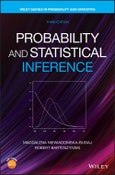Updated classic statistics text, with new problems and examples
Probability and Statistical Inference, Third Edition helps students grasp essential concepts of statistics and its probabilistic foundations. This book focuses on the development of intuition and understanding in the subject through a wealth of examples illustrating concepts, theorems, and methods. The reader will recognize and fully understand the why and not just the how behind the introduced material.
In this Third Edition, the reader will find a new chapter on Bayesian statistics, 70 new problems and an appendix with the supporting R code. This book is suitable for upper-level undergraduates or first-year graduate students studying statistics or related disciplines, such as mathematics or engineering. This Third Edition:
- Introduces an all-new chapter on Bayesian statistics and offers thorough explanations of advanced statistics and probability topics
- Includes 650 problems and over 400 examples - an excellent resource for the mathematical statistics class sequence in the increasingly popular "flipped classroom" format
- Offers students in statistics, mathematics, engineering and related fields a user-friendly resource
- Provides practicing professionals valuable insight into statistical tools
Probability and Statistical Inference offers a unique approach to problems that allows the reader to fully integrate the knowledge gained from the text, thus, enhancing a more complete and honest understanding of the topic.
Table of Contents
Preface to Third Edition xi
Preface to Second Edition xiii
About the Companion Website xvi
1 Experiments, Sample Spaces, and Events 1
1.1 Introduction 1
1.2 Sample Space 2
1.3 Algebra of Events 8
1.4 Infinite Operations on Events 13
2 Probability 21
2.1 Introduction 21
2.2 Probability as a Frequency 21
2.3 Axioms of Probability 22
2.4 Consequences of the Axioms 26
2.5 Classical Probability 30
2.6 Necessity of the Axioms 31
2.7 Subjective Probability 35
3 Counting 39
3.1 Introduction 39
3.2 Product Sets, Orderings, and Permutations 39
3.3 Binomial Coefficients 44
3.4 Multinomial Coefficients 56
4 Conditional Probability, Independence, and Markov Chains 59
4.1 Introduction 59
4.2 Conditional Probability 60
4.3 Partitions; Total Probability Formula 65
4.4 Bayes’ Formula 69
4.5 Independence 74
4.6 Exchangeability; Conditional Independence 80
4.7 Markov Chains* 82
5 Random Variables: Univariate Case 93
5.1 Introduction 93
5.2 Distributions of Random Variables 94
5.3 Discrete and Continuous Random Variables 102
5.4 Functions of Random Variables 112
5.5 Survival and Hazard Functions 118
6 Random Variables: Multivariate Case 123
6.1 Bivariate Distributions 123
6.2 Marginal Distributions; Independence 129
6.3 Conditional Distributions 140
6.4 Bivariate Transformations 147
6.5 Multidimensional Distributions 155
7 Expectation 163
7.1 Introduction 163
7.2 Expected Value 164
7.3 Expectation as an Integral 171
7.4 Properties of Expectation 177
7.5 Moments 184
7.6 Variance 191
7.7 Conditional Expectation 202
7.8 Inequalities 206
8 Selected Families of Distributions 211
8.1 Bernoulli Trials and Related Distributions 211
8.2 Hypergeometric Distribution 223
8.3 Poisson Distribution and Poisson Process 228
8.4 Exponential, Gamma, and Related Distributions 240
8.5 Normal Distribution 246
8.6 Beta Distribution 255
9 Random Samples 259
9.1 Statistics and Sampling Distributions 259
9.2 Distributions Related to Normal 261
9.3 Order Statistics 266
9.4 Generating Random Samples 272
9.5 Convergence 276
9.6 Central Limit Theorem 287
10 Introduction to Statistical Inference 295
10.1 Overview 295
10.2 Basic Models 298
10.3 Sampling 299
10.4 Measurement Scales 305
11 Estimation 309
11.1 Introduction 309
11.2 Consistency 313
11.3 Loss, Risk, and Admissibility 316
11.4 Efficiency 321
11.5 Methods of Obtaining Estimators 328
11.6 Sufficiency 345
11.7 Interval Estimation 359
12 Testing Statistical Hypotheses 373
12.1 Introduction 373
12.2 Intuitive Background 377
12.3 Most Powerful Tests 384
12.4 Uniformly Most Powerful Tests 396
12.5 Unbiased Tests 402
12.6 Generalized Likelihood Ratio Tests 405
12.7 Conditional Tests 412
12.8 Tests and Confidence Intervals 415
12.9 Review of Tests for Normal Distributions 416
12.10 Monte Carlo, Bootstrap, and Permutation Tests 424
13 Linear Models 429
13.1 Introduction 429
13.2 Regression of the First and Second Kind 431
13.3 Distributional Assumptions 436
13.4 Linear Regression in the Normal Case 438
13.5 Testing Linearity 444
13.6 Prediction 447
13.7 Inverse Regression 449
13.8 BLUE 451
13.9 Regression Toward the Mean 453
13.10 Analysis of Variance 455
13.11 One-Way Layout 455
13.12 Two-Way Layout 458
13.13 ANOVA Models with Interaction 461
13.14 Further Extensions 465
14 Rank Methods 467
14.1 Introduction 467
14.2 Glivenko-Cantelli Theorem 468
14.3 Kolmogorov-Smirnov Tests 471
14.4 One-Sample Rank Tests 478
14.5 Two-Sample Rank Tests 484
14.6 Kruskal-Wallis Test 488
15 Analysis of Categorical Data 491
15.1 Introduction 491
15.2 Chi-Square Tests 492
15.3 Homogeneity and Independence 499
15.4 Consistency and Power 504
15.5 2 × 2 Contingency Tables 509
15.6 r × c Contingency Tables 516
16 Basics of Bayesian Statistics 521
16.1 Introduction 521
16.2 Prior and Posterior Distributions 522
16.3 Bayesian Inference 529
16.4 Final Comments 543
Appendix A Supporting R Code 545
Appendix B Statistical Tables 551
Bibliography 555
Answers to Odd-Numbered Problems 559
Index 571








